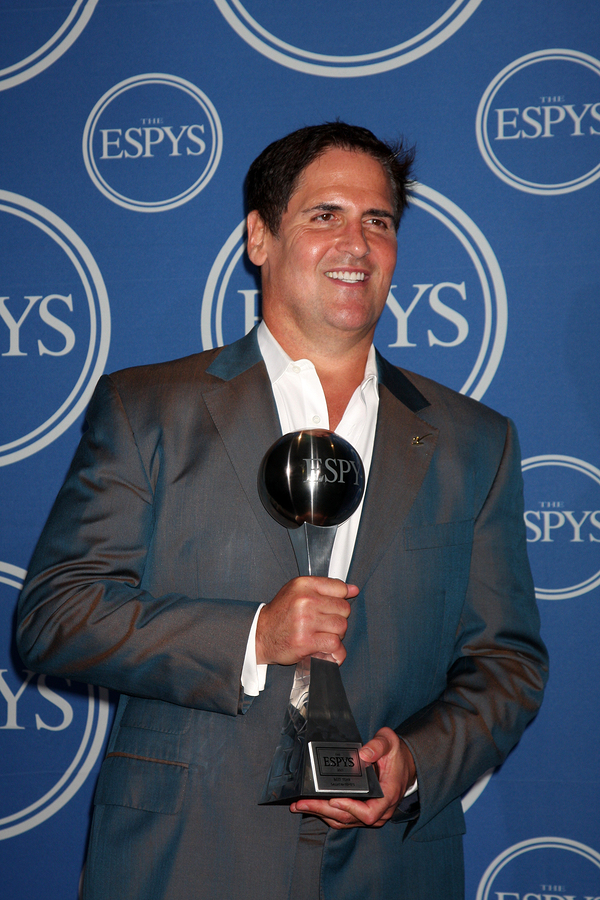Mark Cuban is a successful billionaire entrepreneur. He owns The Dallas Mavericks NBA basketball team, is one of the most heralded stars of ABC’s hugely successful “Shark Tank” show, and is an author of eBooks such as “How to Win in the Sport of Business,” in which he compares the sport of basketball to running a business.
In this post, we look at 12 of Mark Cuban’s best tips that he gives to entrepreneurs in that book, which were featured recently on Entrepreneur.com. These are all very no-nonsense tips that you can benefit from if you think about what they mean. Cuban is a pragmatic capitalist who believes you should do what works, and forget what anyone says.

Mark’s 12 Tips for Entrepreneurs
1. Don’t start a company unless it’s an obsession and something you love.– Mark believes that if you don’t love what you do, you will fail. This is a sentiment echoed by other entrepreneurs, such as Steve Jobs who often said that “what you do as an entrepreneur is so hard that you can’t do it if you don’t love it.” What both Jobs and Cuban are referring to is “passion.”
Aristotle once said, “Law is reason free from passion,” but even lawyers who are dedicated to their work disagree with this Aristotle quote and say that passion for their work and belief in their client plays a large role in their success.
Cuban tells entrepreneurs in his book, “How to Win at the Sport of Business,” that you must love what you do to be successful.
2. If you have an exit strategy, it’s not an obsession.– Cuban adds to his belief that you must love what you do by stating that, if you have a way out of your business if it doesn’t work out, it’s not an obsession. He believes you have to have a business that you are obsessed about because that drives your dedication and motivation to make it work.
3. Hire people who you think will love working there.– Just as you must have a complete obsession and love of the work you do, you should also strive to find people who share your passion. Look for employees and contractors who are truly committed to your idea and your business to move toward your goals.
4. Know how your company will make money and how you will make sales.– You must have a plan that is practical that takes into account a succinct plan on how ou will make sales with your business.
5. Know your core competencies and focus on being great at them.– Cuban believes that you should focus on your core skills and not try to expand too quickly. He has stated this not only in his books but also on “Shark Tank” many times when speaking to entrepreneurs and startups. You can overextend too early, and this can cost you money that can put you out of business. So he advises entrepreneurs to stick to their primary skills first and expand as you can afford to.
He even states that you should never listen to your customers. This is a bold statement, but his point is that customers can sometimes get you off track in what you know you should do with your business. So stick to your guidelines and keep your eye on the ball.
6. Keep business to business.– Though Cuban is a fun-loving guy, he thinks there is too much downtime in many offices, and this can result in a loss of reserve. Don’t put in expresso machines and things that can detract from productivity.
7. No offices.– Cuban is sometimes known for his off-the-wall ideas, and this may be one of them. It parts from the norm, but it’s understandable when you want to build a successful sales team. Having open offices encourages more teamwork among key sales personnel and others who are most important to your success. More communication means more collaboration and results.
8. Use the technology that you know best.– Technology is meant to be a tool, not an end result. For startups, it’s important not to buy into the idea that having the latest technology is more important than using what you have. He says that you should question why you like the tech that you like and then use it if it helps your business. It doesn’t matter what anyone else thinks.
9. Keep your organizational structure simple.– You should not have managers on the middle and upper levels where you are dividing the communication. Cuban believes you create politics doing this and that it will result in havoc for a new business.
10. Don’t invest in personalized branding.– Cuban advises company owners to watch purchasing too many shirts and caps with your logo on them. He says that, while it’s okay to do this for your staff, you should not spend too much on this if you plan to send them to others outside of your organization.
11. Never hire a PR firm.– Cuban believes that hiring PR firms is a waste of money. It also creates a rift between you and your potential B2B partners and clients. PR Firms tend to put a middle man between you and others when they would rather hear from you instead. Sending an email directly from you introducing yourself and your company will do a lot more good than hiring PR people to do it for you.
12. Make the job fun for employees.– If you want to keep your company employees happy, reward them for a job well-done. Look for ways you can help them to achieve their personal goals while adding to the value of the company. You need to keep your employees happy if you are going to continue to enjoy success on a regular basis.
Cuban remembers fondly when he worked with Broadcast.com, one of the very first online radio station portal sites that I discovered over 15 years ago, he had a photo shot of the sales group and took them all out for beers and pizza. In another venture with MicroSolutions, a technology company in which Cuban helped businesses with technical information and videos, he walked around handing out $100 bills for great sales records.
Cuban not only knew how to make his employees happy. He also did this with his vendors, which increased the level of excitement among B2B partners as well.

Summary
It’s clear that Mark Cuban has his eye on the goal. That’s why he sold Broadcast.com for 2.6 billion to Yahoo. That’s why he has turned the Dallas Mavericks into the sensation it is now, updated all of the equipment and recruited better players. That’s why he has been successful many almost all of the investments he makes on “Shark Tank.”
He is a practical thinker. He dreams big, but he creates a solid practical plan that he knows will produce the results he wants. And he never gives up.
Which of these tips can you use in your own business? Have you tried any of them? You can check out Mark’s book on Amazon or wherever you buy books and read the whole thing for even more in-depth information. But the bottom line is that the successful entrepreneur always has a game plan, and they are determined to win.
And they do.
